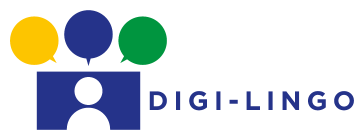Final conference
Participate in DIGI-LINGOs final conference about foreign language teaching in the classroom the 8th of November 2024.
Foreign language teaching in the classroom
The DIGI-LINGO project is concluding with a final conference the 8th of November 2024. The title is 'Foreign language teaching in the classroom – with blended learning, digital tools, personalised learning and virtual exchanges'.
The aim of the conference is to inspire others to use the developed models and tools to improve digital language learning and the use of virtual exchanges and to spread this across European schools and educational institutions.
This conference is for both physical and online participants and will showcase the results of the project along with expert presentations.
We hope the final conference will inspire schools, teachers, advisors and language institutions.
Conference attendance is free of charge.
Where and when
Date: 8th of November 2024
Time: 09.00-15.00
Place: The Herman Teirlinck Building, Havenlaan 88 , 1000 Bruxelles
Practical information: In the lobby, you will find coffee, tea, water and biscuits between 8.00 and 9.00 a.m., refreshments in the break and lunch.
Program and presentations
9.00: Welcome and introduction
By lead partner, DIGI-LINGO, Lene Brinch Knudsen, Denmark.
9.15: A shortage of language teachers and a lack of motivation for languages among students
By Hanne Wacher Kjærgaard, NCFF, Denmark.
Hanne will give an overview of data on and challenges facing language teaching in Denmark and present a recent analysis of students' perspectives on language learning, comparing the findings to the situation in other countries.
10.15: Theoretical grounds, identification of good practices and recommendations to enhance digital language teaching
By Usoa Toledo and Amaia Lersundi Pérez, University of Mondragon, Basque Country.
A brief explanation of the theoretical pillars that constitute the DIGI-LINGO analytic framework, including indicators to identify effective language teaching practices and recommendations for improvement.
11.00: In the year 2525, unlocking foreign language education?
By Dilys Vyncke, PBD GO! Het Gemeenschapsonderwijs, Belgium.
Guidelines on digital foreign language learning, teaching and virtual exchange programs, including teacher testimonials.
11.30: AI and the DIGI-LINGO approach to teaching and learning changes everything!
By Ina Sicilie Larsen, teacher and AI-pedagogue at Slåtthaug vgs, Ellen Hoisaeter, teacher at Nordahl Grieg vgs, Maria Stubhaug, digital educator at Førde vgs and Kjetil Bratheland, senior advisor at Vestland Fylkeskommune, Norway.
An introduction to the four phases: Planning, carrying out the lessons, assessment and evaluation.
Examples of how to plan, teach, assess, and evaluate using the DIGI-LINGO Teaching and Learning Approach.
13.10: Empowering Language Teachers: A Model for Virtual Exchanges
By Alexandra Almpanidou, European Schoolnet, Belgium.
The workshop will introduce the organizational model that supports foreign language teachers in virtual exchanges.
The session will provide an overview of the model, including practical tips and good practices, serving as a guide for easy implementation.
Attendees will leave equipped with strategies to foster sustainable, transnational learning experiences focused on language acquisition.
13.40: Data, Learning Analytics, and AI for Language Learning
By Barbara Wasson, director of the Centre for the Science of Learning & Technology (SLATE), University of Bergen, Norway.
Data is the oxygen for learning analytics and artificial intelligence. Using examples from education, including language learning, Barbara Wasson will introduce these concepts.
Speakers


Hanne Wacher Kjærgaard
Director of the Danish National Center for Foreign Languages (NCFF) in Denmark.


Usoa Toledo
Researcher in the area of Educational Innovation: Languages and cultures in society and at school, at the University of Mondragon, Basque Country.


Amaia Lersundi Pérez
Researcher in the area of Educational Innovation: Languages and cultures in society and at school, at the University of Mondragon, Basque Country.


Dilys Vyncke
Pedagogical advisor for secondary education, PBD GO! Het Gemeenschapsonderwijs, Belgium.


Kjetil Bratheland
Senior advisor, Vestland County Administration, Norway.


Alexandra Almpanidou
Pedagogical Coordinator, European Schoolnet, Belgium.


Barbara Wasson
Director of the Centre for the Science of Learning & Technology (SLATE), University of Bergen, is Professor at the Department of Information and Media Science, Norway.


Lene Brinch Knudsen
Advisor Education and Competence, Regional Development, Central Denmark Region, Denmark.


Ann-Elin Durøy
Vestland County Administration, Norway.
